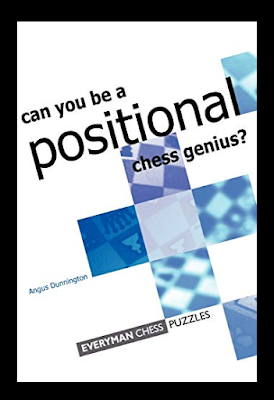 |
| Can you be a Positional Chess Genius Dunnington, Jacob |
Can you be a Positional Chess Genius
Dunnington, Jacob
Chess is one of the most extraordinary pastimes. It is a game that has been thoroughly studied and seems, however, to be inexhaustible. Every year hundreds of books on chess go on sale: openings, midgame, finals, problems, tactical positions, combination exercises, game history, etc., and yet there still seems to be much to understand and discover.
For the tournament player, the competitor, probably the most significant books are those dealing with tactical, combination exercises. It is, in some way, a kind of "exam" to solve. The authors of this type of book put us in positions where it is said: "White plays and wins", "Black plays and ties", etc. And depending on the author, these books can offer truly complex exercises.
However, a common complaint of these works is that the exercises presented to the reader already indicate to the reader that there is something in the position, something that obviously we do not have as help in a game. Come on, there is no pixie, in the tournament game, that tells us: "here you can win the enemy queen," for example. Thus, critics doubt the teachings of these books because in tournament games the solutions to board problems usually don't seem to be very simple.
The book, Can you be a Positional Chess Genius? (Can you be a positional chess genius?), Everyman Chess 2002, 144 pages, about $ 25 on Amazon.com, by international master Angus Dunnington, is a curious chess exercise book, for there are no solutions to problems here of tactics, there are no great combinations, none of that. Here we seek to learn about positional maneuvers, those that in some sense give long-term advantages.
The book contains 150 positions to be solved, of varying difficulty. The author has done an interesting job, as he presents a range of positional ideas. Each position is accompanied by some tips to better understand the position to be solved (although there will be criticism of this again, because again, they give help to the player that he will never have on the board, in the tournament game). These little aids are supplemented by a section called “Ask a Grandmaster”. The solutions have explanatory notes and corresponding variants. The reader is awarded points depending on the number of ideas found and how many aids he had to consult.
Dunnington's book is certainly a good challenge for the chess player, as the reader is forced to consider a type of position where you have to find what to do, instead of expecting to find a surprising sacrifice or a victory in a couple of plays. The benefits of analyzing these types of positions will undoubtedly favor the understanding of the chess player. Perhaps what leaves something to be desired is the point system and how Dunnington rates readers. It would have been better to give an evaluation in terms of chess rating, for example, "" the correct solution for this exercise is someone from strength 2200 ", to give" 10 points for this exercise ". Likewise, the section "Ask a great teacher" does not seem to be so useful because sometimes what he says there does not seem to be very helpful: "Time to turn the table" What kind of advice is that? Perhaps if we forget about this rating system and see the positions to analyze them only, the book can be considered as very beneficial for the tournament player. It is in this hard work that positional chess means.


